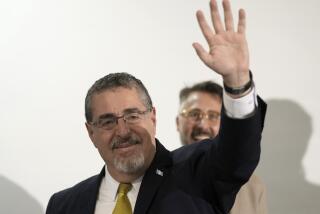Turkmenistan Poised to Benefit From Big Dreams of Benevolent Dictator : Central Asia: There’s no escaping the insatiable ego of President Niyazov. But his desperately poor ex-Soviet republic may soon become the richest.
- Share via
ASHGABAT, Turkmenistan — As the Turkmenistan Airlines flight begins its descent, an attendant makes three announcements: Put out your cigarettes. Fasten your seat belts. Give thanks to Saparmurat Niyazov.
“Due to his wise and farsighted leadership, Turkmenistan achieved independence and is moving swiftly toward a prosperous future,” she says.
The announcement is the first taste of unctuous Niyazov worship and big dreams in this Central Asian country, which used to be the poorest republic in the Soviet Union and soon may become the richest.
Photographs of the white-haired, grandfatherly looking dictator, who fancies himself a poet, adorn the new international airport named for him. Along the road to the capital, trafficked by camels as well as cars, the portraits grow to billboard size and include selections from his verse.
Niyazov, 54, rules Turkmenistan’s 4 million people with absolute authority, relative benevolence and unbridled egotism.
He has erected more statues of himself than any ruler alive, except perhaps Kim Il Sung of North Korea. He is the center of a communist-style personality cult to rival those of Mao, Castro and Stalin.
The future, however, may turn him into more of a sheik than a shibboleth.
Tiny Turkmenistan, although desperately poor today, has riches under its sand: an estimated 35 billion barrels of oil and enormous supplies of natural gas. The gas reserves are believed to be 21 trillion cubic meters, or 20% of the total in the Arab states, twice the volume in Britain’s North Sea fields and five times the Gulf of Mexico’s reserves.
Niyazov is determined to extract the gas and build pipelines that will deliver it to Europe and Japan.
“These are the third-largest reserves of gas in the world, after Russia and the U.S.A.,” said Pedro Schreiterer, director of operations in Turkmenistan for the Argentine petroleum company Bridas. “If they can get access to sell it to the Western countries, you will have a second Saudi Arabia here. You will have a real boom.”
Before independence in 1991, Niyazov was head of the Turkmenistan Communist Party. It is called the Democratic Party now, but otherwise is little changed.
Niyazov was elected president in 1992 with 99.95% of the vote. He did even better--99.99%--in a referendum this year that extended his term until 2002.
Both times, he was the only candidate.
Niyazov has taken on the trappings of the Turkish khans as well as the Soviet commissars who preceded him. The former atheist now professes Islam, wears a ceremonial lambskin shawl over his business suit, parades his membership in the dominant Teke tribe and has added the title “Turkmenbashi”--Leader of all Turkmen--to that of president.
Niyazov’s spokesman, Akamurat Baliyev, says that his boss is really a modest man, that it is his grateful people who insist on naming streets, schools, towns, farms and children after him.
“It’s our tradition, it’s in our blood,” Baliyev said in an interview at the presidential palace. “In the past we had khans. Whoever runs our country must be respected.
“I have a son in first grade. No one tells him anything about the president, but he already knows 10 couplets about the president--and wrote one himself.”
Despite rigid censorship, there is a tangible undercurrent of dissatisfaction with Niyazov. Ridicule of the statues and billboards is widespread.
It doesn’t help that his face is on every manat, the new currency, whose value has fallen precipitously. It trades on the black market for one-tenth of the official exchange rate.
“Things are being done for the people, but not quickly,” said Anvar, 35. “I think more could have been done so that we would feel freedom.”
Like most critics of the dictator, Anwar would not give his last name.
All staple foods--meat, sugar, butter, rice and vegetable oil--are rationed. So are vodka and soap. Infant mortality is the highest in the former Soviet Union: Ninety-four of every 1,000 babies die in their first year.
Looking around at the ethnic warfare and economic chaos in their sister republics, however, makes at least some of Niyazov’s people feel better. Turkmenistan may have less democracy, but it has more stability.
“I know an election with only one candidate is not a real election, but if there were another candidate for president, there would be disagreement,” said Mukhammed Bainazorov, 37, a high school math teacher.
Is disagreement so bad?
“Of course it’s bad. Look at Azerbaijan. Look at Georgia. Disagreement leads to war.”
Western diplomats and human rights groups are critical of Niyazov, but say he is gentler than the old Soviet regime.
“The pressure on people is through their ability to get work or to get published, not through political prisoners or mental hospitals,” said the U.S. ambassador, Joseph S. Hulings III.
Niyazov has promised his people “10 years of prosperity,” and many are willing to give him a chance to deliver.
“We are a patient people, and we hope we will be rich before too long,” said Sapar Karimov, a 22-year-old photographer.
Turkmenistan already produces 80 billion cubic meters of gas a year, which would be worth about $6.4 billion at world prices. That is $1,600 for every man, woman and child in a country where the average adult earns less than $500 a year.
The problem is that Turkmenistan does not get world prices. All the existing pipelines run north into the former Soviet Union to countries that still pay less, if they pay at all.
Fellow ex-Soviet republics now owe Turkmenistan $1.5 billion. It has repeatedly threatened to cut off gas if Ukraine, Georgia and Azerbaijan do not pay at least part of their bills.
Dreams of prosperity hinge on two immense pipeline projects, both still on the drawing boards.
An international consortium headed by former U.S. Secretary of State Alexander M. Haig Jr. hopes to build a $2.9-billion pipeline through Iran and Turkey to Europe.
Mitsubishi, the Japanese industrial giant, is exploring the possibility of a $10-billion pipeline running through Kazakhstan and China to ports feeding Japan.
If either plan becomes reality, Niyazov could live in splendor and still have plenty of wealth to share with Turkmenistan’s small population.
In anticipation, he has bought two personal jets, a Boeing 737 and a Boeing 757, and has begun giving the people free electricity, gas, water and salt.
The first trickle of wealth has created a row of fancy hotels on the outskirts of Ashgabat for visiting petroleum executives. They offer rooms for $250 to $750 a night, saunas, champagne and pepper steak.
Across the road, Annaguzel Babayeva tends her sheep against the backdrop of the snow-capped Kapetdag Mountains.
“We live simply,” she said, “and I think we will continue to live simply.”
More to Read
Sign up for Essential California
The most important California stories and recommendations in your inbox every morning.
You may occasionally receive promotional content from the Los Angeles Times.













